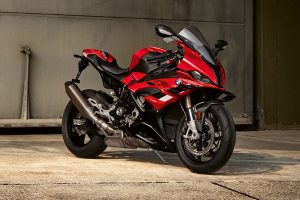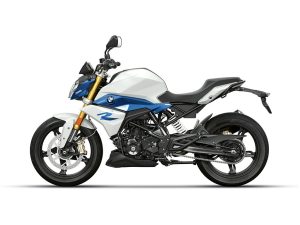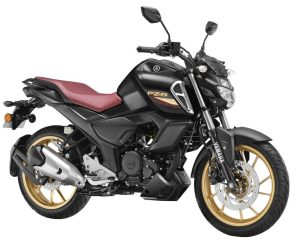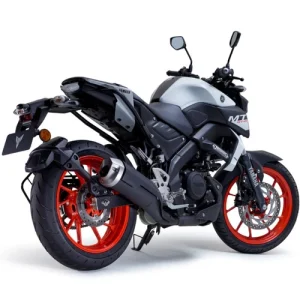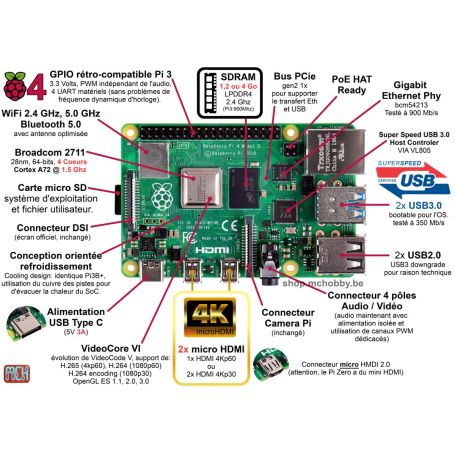
Versatility of The The Raspberry Pi 4
The Raspberry Pi 4 Model B is the most powerful and versatile Raspberry Pi yet, released in June 2019. Designed for makers, developers, and hobbyists, it has taken the concept of a single-board computer to the next level, delivering desktop-level performance at an affordable price. Here’s an all-encompassing overview of everything you need to know about the Raspberry Pi 4 Model B.
1. The The Raspberry Pi 4 Key Specifications
The Raspberry Pi 4 Model B comes with impressive hardware updates compared to its predecessors:
| Component | Details |
|---|---|
| Processor | Broadcom BCM2711, Quad-core Cortex-A72 (ARM v8) 64-bit SoC @ 1.5GHz |
| Memory (RAM) | 1GB, 2GB, 4GB, or 8GB LPDDR4-3200 SDRAM |
| GPU | Broadcom VideoCore VI, supporting OpenGL ES 3.0, 4Kp60 video decode |
| Storage | microSD slot for OS and data storage |
| Networking | Gigabit Ethernet, 2.4GHz & 5.0GHz dual-band Wi-Fi, Bluetooth 5.0 BLE |
| Ports | 2 × USB 3.0, 2 × USB 2.0, USB-C power input, 2 × micro HDMI (4Kp60 support) |
| GPIO | 40-pin GPIO header, backwards compatible with earlier Raspberry Pi boards |
| Camera/Display | MIPI DSI display port, MIPI CSI camera port |
| Power | 5V/3A via USB-C or GPIO pins, 4.2V–5V for external supplies |
| Dimensions | 85.6 mm × 56.5 mm × 17 mm |
2. Performance Highlights
Processor Upgrade
The Raspberry Pi 4’s Cortex-A72 processor delivers approximately 3× the performance of its predecessor (Raspberry Pi 3 Model B+). It supports multitasking, media consumption, and development workflows with ease.
RAM Variants
With up to 8GB LPDDR4 RAM, you can choose the model that fits your needs:
- 1GB: Best for basic projects and prototyping.
- 2GB: Ideal for moderate computing tasks.
- 4GB: Great for most general-purpose desktop applications.
- 8GB: Perfect for advanced use cases like AI/ML, Kubernetes clusters, or heavy media editing.
GPU and Media Support
The VideoCore VI GPU supports dual 4K displays via its two micro HDMI ports, making it suitable for multimedia applications and light gaming. Hardware decoding supports H.265 video at up to 4Kp60.
3. The Raspberry Pi 4 Connectivity and Ports
High-Speed USB Ports
- 2 × USB 3.0 ports offer up to 10× faster data transfer rates compared to USB 2.0.
Networking
- Gigabit Ethernet: Full-speed wired connections for fast data transfer.
- Dual-band Wi-Fi: Reliable wireless connectivity with support for 2.4GHz and 5GHz bands.
- Bluetooth 5.0: Enhanced range and lower power consumption.
Dual Micro HDMI
- Supports resolutions up to 4Kp60 on two monitors simultaneously, great for productivity or media applications.
4. Software and Operating System
The Raspberry Pi 4 runs on Raspberry Pi OS (formerly Raspbian), a Debian-based Linux distribution optimized for the hardware. It also supports other operating systems, including:
- Ubuntu
- Kali Linux
- RetroPie (for gaming enthusiasts)
- Windows IoT Core
5. Power Requirements
The Raspberry Pi 4 requires a 5V/3A USB-C power supply. A high-quality power source is essential to avoid performance issues, especially when connecting peripherals.
6. Use Cases
The Raspberry Pi 4 Model B opens up a wide range of possibilities:
1. Desktop Replacement
- With 4GB or 8GB RAM, you can use the Raspberry Pi 4 as a budget desktop PC for web browsing, document editing, and media consumption.
2. Media Center
- Pair it with software like Kodi to create a 4K home theater PC (HTPC).
3. IoT and Automation
- Perfect for DIY IoT projects, smart home systems, and industrial automation.
4. Game Emulation
- Use RetroPie or Lakka to emulate classic gaming systems like SNES, PS1, and N64.
5. Learning and Education
- Great for teaching programming, electronics, and robotics in schools or at home.
6. Development
- Ideal for software development, especially for Python, Node.js, and machine learning enthusiasts.
7. Server Applications
- Host lightweight web servers, VPNs, or even Kubernetes clusters.
7. Accessories and Ecosystem
The Raspberry Pi 4 has a vast array of accessories, including:
- Cases: Protect your Pi and improve heat dissipation.
- Cooling Solutions: Heatsinks and fans to manage thermals.
- HATs (Hardware Attached on Top): Add functionality like motor control, sensors, and displays.
- Power Supply Units: Official or third-party options.
8. The The Raspberry Pi 4 Price and Availability
The Raspberry Pi 4 Model B is priced as follows:
- 1GB RAM: Discontinued
- 2GB RAM: ~$45 USD
- 4GB RAM: ~$55 USD
- 8GB RAM: ~$75 USD
Prices may vary depending on your location and retailer.
9. Downsides and Limitations of The The Raspberry Pi 4
While this is a fantastic device, it does have some limitations:
- Power Consumption: Higher than previous models.
- Heat Management: Can run hot under load, requiring additional cooling.
- Limited GPU Power: Not suitable for modern AAA gaming.
10. Community and Resources
The Raspberry Pi community is vibrant and supportive, offering:
- Forums and discussion boards.
- Tutorials and projects on the Raspberry Pi website.
- Books and guides for beginners and advanced users.
The Raspberry Pi 4 Model B is a game-changer in the single-board computer world, offering unmatched versatility and performance at an affordable price. Whether you’re a hobbyist, student, or professional, this little powerhouse can help you bring your ideas to life.




